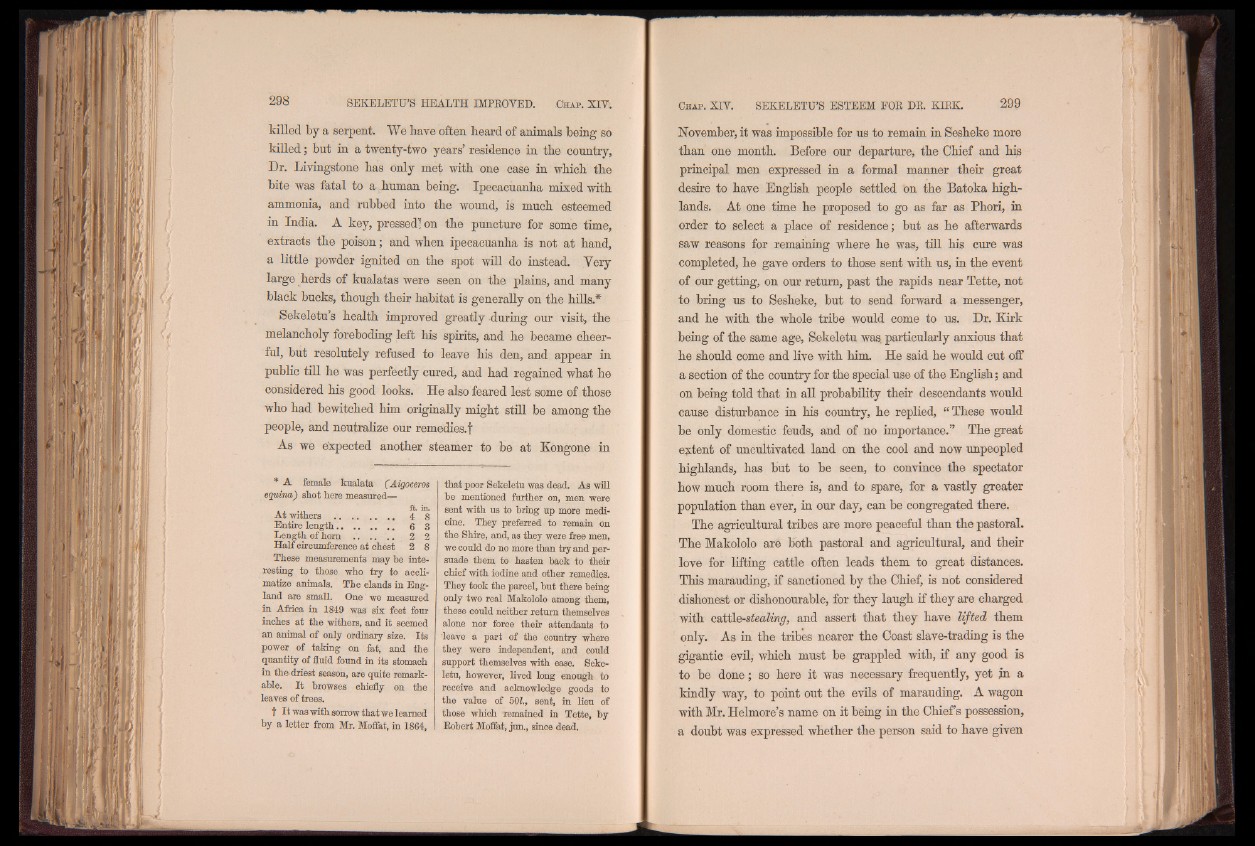
killed by a serpent. We have often heard of animals being so
killed; but in a twenty-two years’ residence in the country,
Dr. Livingstone has only met with one case in whieh the
bite was fatal to a human being. Ipecacuanha mixed with
ammonia, and rubbed into the wound, is much esteemed
in India. A key, pressed! on the puncture for some time,
extracts the poison; and when ipecacuanha is not at hand,
a little powder ignited on the spot will do instead. Yery
large herds of kualatas were seen on the plains, and many
black bucks, though their habitat is generally on the hills.*
Sekeletu’s health improved greatly during our visit, the
melancholy foreboding left his spirits, and he became cheerful,
but resolutely refused to leave his den, and appear in
public till he was perfectly cured, and had regained what he
considered his good looks. He also feared lest some of those
who had bewitched him originally might still be among the
people, and neutralize our remedies, t
As we expected another steamer to be at Kongone in
* A female kualata (Aigoceros
eguina) shot here measured—
. f t . in . At withers ....................... 4 8
Entire length...................... 6 3
Length of horn ............... 2 2
Half circumference at chest 2 8
These measurements may be interesting
to those who try to acclimatize
animals. The elands in England
are small. One' we measured
in Africa in 1849 was six feet four
inches at the withers, and it seemed
an animal of only ordinary size. Its
power of taking on &t, and the
quantity of fluid found in its stomach
in the-driest season, are quite remarkable.
It browses chiefly on the
leaves of trees.
t I t was with sorrow that we learned
by a letter from Mr. Moffat, in 1864,
that poor Sekeletu was dead. As will
be mentioned further on, men were
sent with us to bring up more medicine.
They preferred to remain on
the Shire, and, as they were free men,
we could do no more than try and persuade
them to hasten back to their
chief with iodine and other remedies.
They took the parcel, hut there being
only two real Makololo among them,
these could neither return themselves
alone nor force their attendants to
'leave a part of the country where
they were independent, and could
support themselves with ease. Sekeletu,
however, lived long enough to
receive and acknowledge goods to
the value of 501, sent, in lieu of
those which remained in Tette, by
Kobert Moffat, jun,, since dead.
November, it was impossible for us to remain in Sesbeke more
tban one month. Before our departure, the Chief and his
principal men expressed in a formal manner their great
desire to have English people settled on the Batoka highlands.
At one time he proposed to go as far as Phori, in
order to select a place of residence; but as he afterwards
saw reasons for remaining where he was, till his cure was
completed, he gave orders to those sent with us, in the event
of our getting, on our return, past the rapids near Tette, not
to bring us to Sesheke, but to send forward a messenger,
and he with the whole tribe would come to us. Dr. Kirk
being of the same age, Sekeletu was. particularly anxious that
he should come and live with him. He said he would cut off
a section of the country for the special use of the English; and
on being told that in all probability their descendants would
cause disturbance in his country, he replied, “ These would
be only domestic feuds, and of no importance.” The great
extent of uncultivated land on the cool and now unpeopled
highlands, has but to be seen, to convince the spectator
how much room there is, and to spare, for a vastly greater
population than ever, in our day, can be congregated there.
The agricultural tribes are more peaceful than the pastoral.
The Makololo are both pastoral and agricultural, and their
love for lifting cattle often leads them to great distances.
This marauding, if sanctioned by the Chief, is not considered
dishonest or dishonourable, for they laugh if they are charged
with cattle-stealing, and assert that they have lifted them
only. As in the tribes nearer the Coast slave-trading is the
gigantic evil, which must be grappled with, if any good is
to be done; so here it was necessary frequently, yet in a
kindly way, to point out the evils of marauding. A wagon
with Mr. Helmore’s name on it being in the Chiefs possession,
a doubt was expressed whether the person said to have given